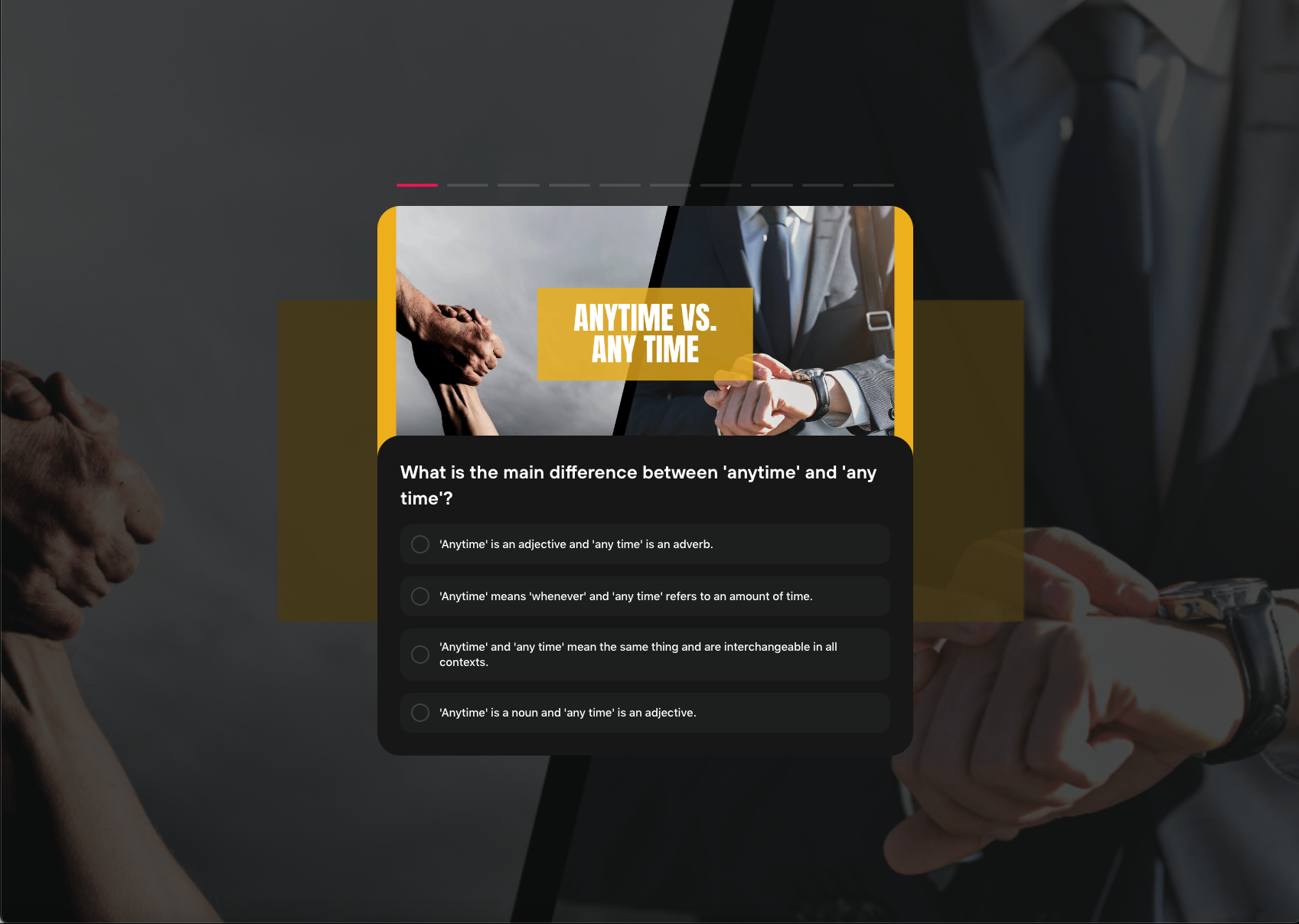Anytime vs. Any Time: How to Use Each Correctly

Anytime vs. Any Time: How to Use Each Correctly
Anytime vs. Any Time: What’s the Difference and When to Use Each Correctly
If you’ve ever wondered whether to write “anytime” or “any time,” you’re not alone. These two expressions are often confused, but their meanings and uses are quite distinct. In this post, we’ll dive into the key differences between “anytime” (one word) and “any time” (two words) so you can use them confidently in your writing. Let’s get started!
Source: Learn English Coach YouTube Channel
The Basics: What’s the Difference?
At first glance, “anytime” and “any time” might seem interchangeable, but they aren’t. Each serves a unique purpose in sentences, and using the wrong one can change the meaning of what you’re trying to say. So, here’s the breakdown:
Anytime (one word) is an adverb that means “whenever” or “at any moment.”
Any time (two words) is a noun phrase that refers to “an amount of time.”
Let’s explore these distinctions further.
Anytime (One Word): Meaning and Usage
When used as one word, “anytime” acts as an adverb. It means “whenever” or “at any moment,” and it can often replace phrases like “whenever it’s convenient” or “whenever you want.” It’s informal, quick, and used to express flexibility.
Here are some examples:
You can call me anytime.
I’m available to help you anytime next week.
Feel free to stop by anytime you’re in the neighborhood.
In these sentences, “anytime” emphasizes that the action can happen at any point in time without restriction.
A Quick Tip:
If you can substitute “whenever” in the sentence and it still makes sense, then you’re probably looking at a situation where “anytime” (one word) is appropriate.
For example:
You can visit me anytime.
You can visit me whenever.
The meaning stays the same, so “anytime” is correct here.
Any Time (Two Words): Meaning and Usage
“Any time” as two words is a noun phrase. It refers to an amount of time. You use “any time” to emphasize time as a resource or specific period. You can pair it with other words like “at,” “in,” or “for” to provide more detail about when something happens.
Let’s look at some examples:
I don’t have any time to go to the gym today.
We can meet at any time that works for you.
Is there any time left for questions?
In these examples, “any time” discusses an unspecified or available amount of time. You’re measuring time, rather than describing flexibility or frequency as you would with “anytime.”
A Quick Tip:
To check if “any time” is the right choice, try replacing it with “some time.” If it works in the sentence, then “any time” (two words) is probably correct.
For example:
Do you have any time to chat today?
Do you have some time to chat today?
Both sentences make sense, so “any time” is the correct choice here.
Common Mistakes to Avoid
Now that you know the difference between the two, it’s time to watch out for common pitfalls. Here are a couple of mistakes that are easy to make:
1. Mistaking “anytime” for “any time” in formal writing:
Since “anytime” is more informal, it’s often not ideal for formal writing. In professional or academic contexts, use “any time” to be safe. For instance, in a business email, you might say, “Please contact me at any time,” rather than “Please contact me anytime.”
2. Forgetting the verb with “any time”:
Remember, “any time” is a noun phrase and usually needs to be connected to a verb to make sense. A sentence like “We can meet any time” works because there’s a verb (meet). But if you drop the verb, it can get confusing.
Compare these:
Correct: “Do you have any time to help me?”
Incorrect: “Do you have any time?” (Here, it’s unclear what action is being asked for.)
When It’s Tricky: Ambiguous Cases
There are times when the distinction between “anytime” and “any time” can seem blurry. For example:
“You can come over anytime.”
“You can come over at any time.”
Both sentences sound correct, right? Here’s why: in casual contexts, people often use them interchangeably. Technically, the first sentence suggests more flexibility (whenever), while the second sentence points to a more specific, measurable moment (at any available time).
Wrapping It Up
To sum up, the difference between “anytime” and “any time” comes down to how you use them:
Use anytime (one word) when you mean “whenever” or “at any moment.”
Use any time (two words) when referring to an amount or availability of time.
By paying attention to whether you’re discussing flexibility or measuring time, you’ll avoid confusion and use these expressions correctly in your writing. Now that you’re equipped with this knowledge, you can confidently choose the right one—anytime!
FREE Quiz
Take our free quiz to test your knowledge on Anytime vs. Any Time. 👉 Click Here to Start the Quiz.






